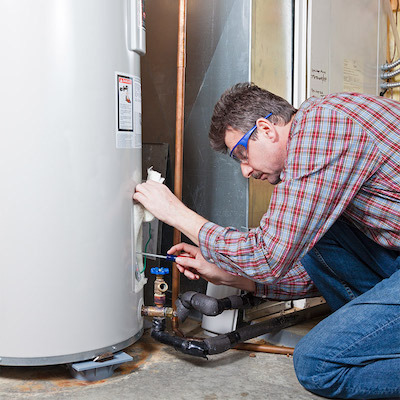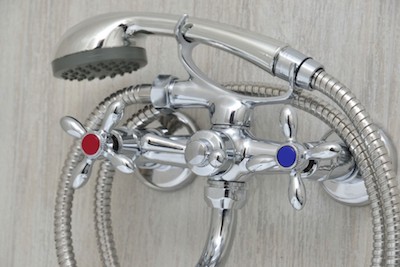When it comes to a broken water heater element, a plumber may be able to replace it. With a new element, the heater’s back in business, and you’re back to enjoying warm, steamy showers. So, if your water heater isn’t producing hot water, how can you tell if it’s the electric element that’s to blame? It may be easier than you think. Before we get to diagnosing, let’s first take a closer look at water heater elements.
How a Water Heater Element Works
 A designated thermostat controls each element. You set the water temperature by adjusting the thermostat. In most cases, 120 to 125 degrees Fahrenheit is a safe and comfortable temperature. The element will then turn on or off to keep the water at the right temperature.
A designated thermostat controls each element. You set the water temperature by adjusting the thermostat. In most cases, 120 to 125 degrees Fahrenheit is a safe and comfortable temperature. The element will then turn on or off to keep the water at the right temperature.
If you have a standard-sized water heater, it probably holds about 40 gallons of water. There are smaller and larger tanks, ranging from about 30 to 65-gallon capacities.
Heating elements can burn out. Sometimes one element fails causing the other element to work overtime. A burnt-out element is a common cause of water heater woes. The thermostat might quit working along with the element.
How to Diagnose a Water Heater Element Problem
You can often tell if a water heater element has failed by turning on the faucet in a sink. No special tools required! Turn on the hot water tap at a sink and check for the following scenarios:
Is the water hot for a short time before running cold? This is a sign that the bottom element has failed. If the upper unit is still working, water at the top of the heater will heat. You’ll get a little bit of hot water before the supply runs out.
Is the water lukewarm?
Is the water cold? If both elements or thermostats have failed, you will only get cold water. There may be other reasons for a dearth of hot water. Check the circuit breaker box before concluding the water heater has failed.
Other Reasons Your Water Might Not be Hot
Cause #1: Broken heating element
If you have an electric water heater, the heating elements inside the tank can break and lead to a loss of hot water. Sometimes, your water will slowly start to cool down and this could be because the element has burned out. If the second element fails, you’ll be left with only cold water. If the heating element is not burned out, it may just have flipped off because of a tripped circuit or a blown fuse, so check the fuse box as well.
Cause #2: Faulty gas control valve
If the gas control valve isn’t working properly, it will cut off the gas supply to the burner won’t be able to get to the water to warm up.
Cause #3: Broken burner
If you have a gas-powered water heater, the burner unit below the tank has gas jets that will light and transfer heat to the water in the tank. If the burner is dirty or begins to corrode, it will have a hard time igniting. Eventually, the gas jets will not be able to turn on and the water in the tank will not heat.
Cause #4: Pilot light
The pilot light will ignite your water heater’s burner and if it goes out, there is nothing to heat the water. You can see if the pilot light is out by removing the cover of the water heater and inspecting the light. Your water heater will usually have directions on how to relight it. Once it’s on, you’ll need to wait about 30 minutes to let the burners heat up the water. If you have done this a few times and the light keeps going out, you should contact a plumbing professional to get it looked at.
If your water is still warm, but not as hot as it normally is, this could also indicate a problem with your tank. Lukewarm water should not be ignored, especially if it continues this way for a long period of time. Contact our team of plumbing professionals at Meticulous Plumbing if the water in your home is not heating up properly.
Water Heater Repair: When to Contact a Portland Plumber
 Minerals may build up in the tank over time, clog plumbing lines, and generally shorten the life of your unit. If your water heater is relatively old and you know your neighborhood has hard water, you may want to contact a plumbing professional to install a new one. Lucking, the Portland area has relatively soft water, so if you live around its metro area, hard water probably won’t be an issue.
Minerals may build up in the tank over time, clog plumbing lines, and generally shorten the life of your unit. If your water heater is relatively old and you know your neighborhood has hard water, you may want to contact a plumbing professional to install a new one. Lucking, the Portland area has relatively soft water, so if you live around its metro area, hard water probably won’t be an issue.
If Your Water Heater is Over 15 Years Old
Most residential water heaters come with a 5-year or 10-year warranty; a new water heater should last at least that long. If your water heater is around 15 years old or more and is experiencing problems such as noises, issues producing hot water, or issues with maintaining a consistent temperature, you should consider replacing the unit.
If Your Water Heater is Leaking
Unfortunately there is no quick fix for a leaking water tank. If you notice any leakage or standing water near the unit, you should contact a professional right away. There problem could worsen quickly and you do not want to have to deal with a potential flooding problem. Call a qualified plumber for professional water heater installation.
Portland water heater repair and installation
If you suspect a problem with a water heater element, get in touch with us. We’ll get you back to warm, comfortable showers in a flash!


